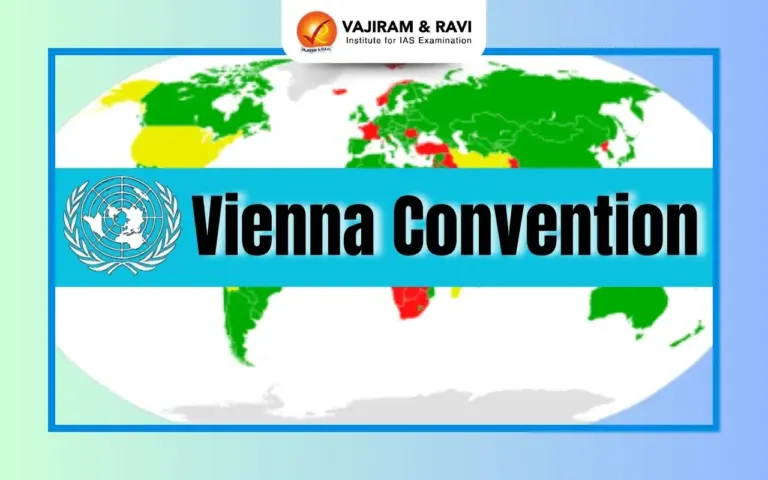The Vienna convention on diplomatic relations outlines the complexities of international laws and these complexities were highlighted recently by the Ministry of External Affairs that had to step in to save a victim involved in the case of diplomatic immunity. The convention was adopted in 1961 and establishes the rules and privileges of diplomatic missions, legal action and their protection in host countries. In this article, we are going to cover all about the Vienna Convention and its significance, functions and powers.
Vienna Convention on Diplomatic Relations
The Vienna Convention on Diplomatic Relations (VCDR) is an international treaty that establishes rules for diplomatic relations between nations, ensuring diplomats can perform their duties without interference. Adopted on 18 April 1961 and enforced from 24 April 1964, it defines diplomatic immunity, privileges, and responsibilities of embassies and consulates. With 193 ratified countries, including India, this treaty is crucial for peaceful international relations.
Why is the Vienna Convention in News?
The Vienna Convention on Diplomatic Relations recently made headlines due to a case involving a Kenyan diplomat’s son. India’s Ministry of External Affairs (MEA) requested Kenya to revoke the diplomatic immunity of the accused in a sexual assault case, highlighting the legal complexities of diplomatic immunity.
Vienna Convention 1961 Key Provisions
The Vienna Convention key provisions include:
- Diplomatic Immunity: Diplomats are protected from arrest, detention, and prosecution, except for actions outside official duties (Articles 29, 31). Immunity can be waived by the home country.
- Protection of Family Members: Family members of diplomats enjoy similar protections as the diplomats.
- Inviolability of Embassies: Diplomatic premises, including residences, are protected from intrusion or damage by the host country.
- Freedom of Communication: Diplomatic communication remains confidential, and diplomatic pouches cannot be opened.
- Non-Interference in Internal Affairs: Diplomats cannot meddle in the host country’s internal matters.
- Persona Non Grata: Host nations can declare a diplomat persona non grata, requiring them to leave.
These provisions ensure smooth diplomatic functions but also raise concerns about misuse of diplomatic immunity.
Vienna Convention on Diplomatic Relations Purpose
The primary aim of the convention is to promote peaceful international relations by protecting diplomats and defining clear diplomatic norms. It safeguards diplomats, allowing them to represent their nations without legal threats, reducing conflicts and misunderstandings.
What is Diplomatic Immunity?
Diplomatic immunity, under the Vienna Convention, shields foreign officials and their families from prosecution in a host country. This ensures diplomats can operate without fear of legal consequences, even in times of tension.
Key Aspects of Diplomatic Immunity:
- Diplomats cannot be arrested or prosecuted in the host country.
- Their residences and offices cannot be searched.
- Diplomatic pouches cannot be opened or detained.
- Family members enjoy similar protections.
- Host nations must provide security to diplomats.
While diplomatic immunity ensures smooth international relations, its misuse has raised concerns. Countries can waive immunity in serious cases, enabling prosecution.
Diplomatic Relations (Vienna Convention) Act 1972
India enacted the Diplomatic Relations (Vienna Convention) Act 1972 to incorporate the convention into national law. This act:
- Legally recognizes diplomatic privileges.
- Establishes procedures for resolving diplomatic disputes.
- Defines cases where diplomatic immunity can be waived.
This act plays a key role in India’s foreign relations and legal framework for diplomatic engagements.
Vienna Convention on Consular Relations 1963
The Vienna Convention on Consular Relations 1963 governs consular relations between countries, focusing on consular officials rather than diplomats.
Key features include:
- Consular Immunity: Consular officers have limited immunity, mainly for official duties.
- Protection of Citizens: Consulates assist nationals in foreign countries.
- Consular Access: Host authorities must inform consulates if they detain a foreign national.
This treaty ensures smooth consular functions and protects citizens abroad.
The Vienna Convention on Diplomatic Relations is a cornerstone of international diplomacy, protecting diplomats and ensuring efficient diplomatic operations. However, recent controversies underscore the need to revisit certain provisions to prevent misuse.
Last updated on March, 2026
→ UPSC Notification 2026 is now out on the official website at upsconline.nic.in.
→ UPSC IFoS Notification 2026 is now out on the official website at upsconline.nic.in.
→ UPSC Calendar 2026 has been released.
→ UPSC Final Result 2025 is expected to be released soon.
→ Check out the latest UPSC Syllabus 2026 here.
→ Join Vajiram & Ravi’s Interview Guidance Programme for expert help to crack your final UPSC stage.
→ UPSC Mains Result 2025 is now out.
→ UPSC Prelims 2026 will be conducted on 24th May, 2026 & UPSC Mains 2026 will be conducted on 21st August 2026.
→ The UPSC Selection Process is of 3 stages-Prelims, Mains and Interview.
→ Prepare effectively with Vajiram & Ravi’s UPSC Prelims Test Series 2026 featuring full-length mock tests, detailed solutions, and performance analysis.
→ Enroll in Vajiram & Ravi’s UPSC Mains Test Series 2026 for structured answer writing practice, expert evaluation, and exam-oriented feedback.
→ Join Vajiram & Ravi’s Best UPSC Mentorship Program for personalized guidance, strategy planning, and one-to-one support from experienced mentors.
→ Check UPSC Marksheet 2024 Here.
→ UPSC Toppers List 2024 is released now. Shakti Dubey is UPSC AIR 1 2024 Topper.
→ Also check Best UPSC Coaching in India
Vienna Convention on Diplomatic Relations FAQs
Q1. What is the Vienna Convention on Diplomatic Relations?+
Q2. What were the main points of the Vienna Convention?+
Q3. Is India part of the Vienna Convention on Diplomatic Relations?+
Q4. What is the difference between the Vienna Convention on Diplomatic Relations and Consular Relations?+
Q5. What is the Vienna Convention explained?+
Tags: Vienna Convention


















